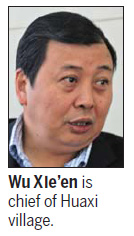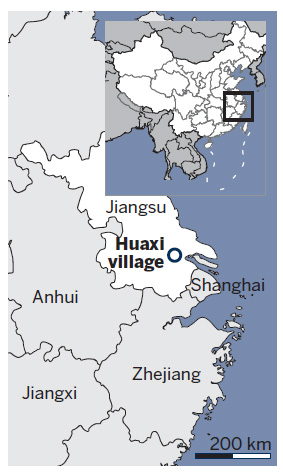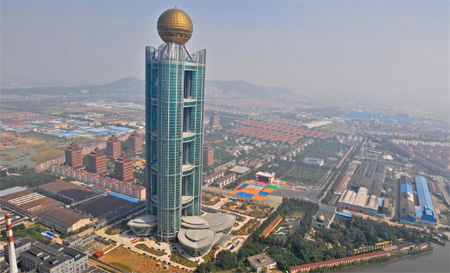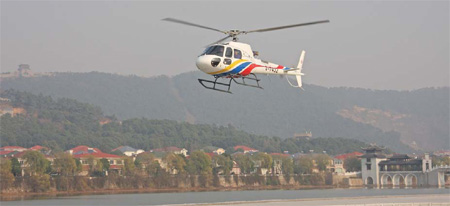Towering success
Updated: 2011-11-25 08:56
By Wang Chao (China Daily)
|
|||||||||
|
Huaxi village, the country's richest, caught public attention by completing the 328-meter-tall, 3-billion-yuan luxury hotel last month. Provided to China Daily |
 |
Huaxi village turns to new pastures for profit as old avenues start losing sheen
It is the richest village in China with revenue of 51.2 billion yuan ($8 billion, 5.94 billion euros) with a 328-meter-tall hotel, and two helicopters as some of its prized possessions. Every family in the village has at least one house or a villa, cars and more than $250,000 in the bank. The villagers of Huaxi, in Jiangyin, Jiangsu province, which is less than 90 minutes' drive from Shanghai, lead a life that many may consider Utopian.
They work in business communes, enjoy free medical care, travel home and abroad with the bills paid by the village, live in free villas given by the village, and enjoy stock options and bonuses provided by the village. But beneath all the wealth and glamour are the travails and tribulations of a group of hard-working people who have made the Utopian dream a reality.
Wu Xie'en, the village chief, says his dream is to build Huaxi Group, the business entity of the Huaxi village, as a company that will last for hundreds of years, instead of just earning billions of dollars.
"We want to win the future with healthy and sustainable development, and have happy and contented residents," says Wu, who took the helm from his father Wu Renbao nine years ago.
Huaxi village has only 2,000 residents in its 0.96 sq km area, yet almost everyone is a millionaire.
Two months ago, a 328-meter-high five-star hotel, Long Wish, costing 3 billion yuan was completed, which includes 16 presidential suites, 800 standard rooms and luxury clubs decorated in pure gold and silver.
Helicopters were introduced earlier this year for tourists to have a bird's-eye view of this surprisingly tidy village - with thousands of identical villas lining up like soldiers, and 10 towers decorated with gold on their roofs sparkling in the sun.
Last year the village realized some 3 billion yuan in profits from the 70-odd steel plants and textile factories that became part of the village in the 1980s. On an average every villager paid about 530,000 yuan as tax in 2010, say village officials.
Villagers' income comprises several parts including shares in the Huaxi enterprises, monthly salaries, end-of-year bonuses, and through other daily necessities provided by the village.
"We have eight major industries and more than 70 factories," says the village chief Wu Xie'en, who is also the president of the Huaxi Group Corp, which controls all the Huaxi businesses.
Wu, 47, says the company used to be ranked the 76th largest company in China. Despite the fast growth of giant State-owned enterprises in China, the Huaxi group was ranked 127 in 2010.
The Wu factor

Wu Xie'en's father Wu Renbao is 84 now. The elder Wu has shaped much of Huaxi's destiny. Wu Renbao was selected as the village chief when Huaxi village was established in 1961, and remained as its chief until 2003.
It was through the elder Wu's dedicated efforts and 43 years of leadership that Huaxi become a star among the more than 600,000 villages in China.
Although the elder Wu is now retired, he is still the icon of the village. Every day he delivers a speech to tourists and tells them the story of the village. Before and after the daily speech, dances and songs are performed for visitors that narrate the elder Wu's wise leadership and devotion.
But Wu says that the village was successful because it "followed the path laid out by the central government".
During the 1960s and 1970s when other villages focused on farming, Wu started a farm tool plant to sell tools and make money for villagers.
"Many people criticized me for following a capitalist path at that time. But I think that whatever suits the local conditions should be used to improve people's living standards," Wu says.
In the 1980s when the government decided to stop collective farming and distribute land to households, Wu once again had his own ideas.
"Huaxi is a small village with little arable land, hence we were not too sure about how to get rich from farming," he says.
At that time, private enterprises had already got the green light from the government, so Wu decided to keep the land under the name of the village as a collective asset, and use it to build factories.
Starting from a shabby tool-making factory, Huaxi gradually developed into steel companies and textile processing factories over the next two decades. By current accounts there are more than 70 factories of all scales in the village.
Although the village benefited from these traditional industries for decades, it felt the development momentum slowing down in recent years.
"As early as in 2003, we realized the risks of the steel companies," Wu Xie'en says. "By then one ton of steel was earning us 700 yuan in profit. It was ridiculously high and I felt that the bubble would burst soon.
"In addition, the steel companies were polluting the environment, hence did not look sustainable in the long run," he says.
Since then the village has intentionally reduced steel production and has turned to more profitable steel products that have higher added value.
Changing times
But the winds of change are now blowing through Huaxi also.
Wu Xie'en says the village is gradually reducing the proportion of traditional industries such as steel and textiles, and increasing the percentage of services such as tourism, financial services, ocean shipping and logistics.
"Seven years ago, all our income came from traditional industries like steel and textiles, but now it has fallen to 70 percent," says Wu Xie'en. "Our goal is to establish a new economic growth model by the end of 2020 with heavy industry and services as the two pillars."
One of the problems that Wu has to contend with is that the village has now grown in size from its original 600 inhabitants and area of 0.96 sq km. Huaxi has now grown in size to 35 sq km through addition of nearby villages and has a population of 35,000.
Though villagers from the merged and new areas are also entitled to annual bonuses and some welfare, most of the privileges are restricted to the indigenous 2,000 residents. The village is also home to more than 20,000 migrant workers who are engaged in various activities.
Though the 2,000 Huaxi villagers are granted shares and other welfare facilities, it is subject to the condition that they live in the village. Once they decide to work outside the village, they lose all the privileges.
Wu says the long-term plan for the village is to develop the northern part as a "granary" dedicated to agriculture, the central area as a "paradise" for residential purposes, and the southern area as "treasury", or industrial region.
The vision is to transform the new Huaxi village as a "metropolis in the countryside", he says. "With the big cities getting saturated with population and industries, China needs more villages like Huaxi to ease the pressure on cities."
Yang Yongchang, president and general manager of Jiangyin Huaxi Steel Co Ltd, says the steel industry in Huaxi has received no new investment from the village in the past six years.
The contribution from steel companies to the village's total revenue has dropped from 60 percent to 25 percent in the period, he says.
"In the next 10 years, we will upgrade the steel industry and add more value."
The steel company is taking a bold move by changing the direction to ocean shipping. Starting 2009, the company has bought 13 cargo ships to transport steel and other commodities to Brazil and other South American countries.
"We bought the ships during the financial crisis when ships were cheap," Yang says. "An $80 million ship was bought by Huaxi Group for only $30 million."
More ships will be purchased and the company plans to be one of the top ocean shipping companies in China by 2015.
The village is also developing warehouse services in ports nearby while heading to the ocean. Up to now it has provided storage services for Mitsubishi and Shell.
"To reassure customers, we are spending 4 million yuan on a real-time monitoring system that guarantees the safety of goods," Wu Xie'en says. "The average attrition rate is 0.3 percent in the industry, but we manage to keep it as low as 0.15 percent."
Keven Hsu, general manager of Jiangsu Huaxi International Trade Co Ltd, which is in charge of the import and export business of Huaxi Village, is also switching focus. Previously the company imported expensive equipment and exported manufacturing products such as wire rods, but now it is trying to reverse direction.
"Since we have sufficient capital in Huaxi, we import raw materials as well, such as iron ore, wool and coal from Australia and other countries. We process them and then sell (the goods) in foreign markets.
"By doing this, the Huaxi Group can earn more revenue," Hsu says. In 2010, the company's foreign trade stood at $300 million (222 million euros). Wool from Australia was the major import.
"We are an important client for Australian wool companies," Hsu says. "That means we can also negotiate a good price."
Looking ahead
According to the blueprint made by the village committee, financial services will be another pillar industry in the next 10 years.
"We have obtained licenses to provide financial services including credit and guarantee services and also bought shares from several banks and securities companies," says Wu Xie'en. "We will also lend surplus capital to small- and medium-sized enterprises in the nearby regions."
With wealth accumulating in Huaxi, "the learning from Huaxi" has also blossomed. During the 50th anniversary of Huaxi in early October, the village greeted more than 500 reporters from all over the world and thousands of tourists.
Wu Renbao, the former village chief, tells visitors that the Huaxi model can be duplicated in other places "if they are decisive enough to carry out the government policies and willing to pursue happiness for their people".
But he warns the Huaxi model needs to be tailored to suit local conditions.
"You have to make full use of local advantages and find your own path to prosperity. The model that fits Huaxi does not necessarily work in other places," he says.
"My father's generation became rich by working hard. Now we have to maintain the prosperity by thinking hard," says Wu Xie'en.
|
Huaxi village has bought two helicopters this year with the aim of developing tourism. Provided to China Daily |












